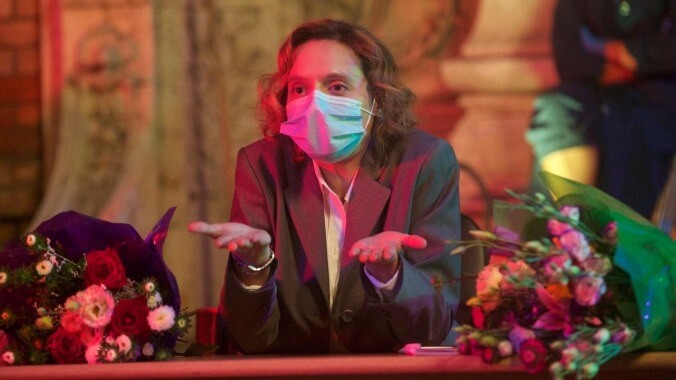The COVID-era satire Bad Luck Banging Or Loony Porn is as loopy as its title
The Berlin Silver Bear winner tries to pull together COVID, capitalism, Romanian history, absurdist comedy, and homemade sex tapes


As if to announce that this isn’t one of those dry intellectual exercises where people debate obscenity but never show us the goods, Bad Luck Banging Or Loony Porn opens with its lead character in flagrante delicto. That’s a coy Latin term for fucking, the deployment of which here is indicative of the content and general tone of this Berlin award-winning work of playful agitprop from Romanian writer-director Radu Jude (“I Do Not Care If We Go Down In History As Barbarians,” Aferim!). The film revolves around Emi Cilibiu (Katia Pascariu), a history teacher at an upscale Bucharest high school whose husband uploads the (quite explicit) sex tape seen at the beginning of the film onto what he thinks is a private fetish website.
That’s a naive attitude when it comes to the internet, of course, and by the time our story begins, everyone at Emi’s workplace—students, administrators, parents—has seen what she and her husband do in bed. After its brazen introductory sequence, Bad Luck Banging divides its story into three parts: “One Way Street,” in which Emi walks around COVID-era Bucharest preparing for the meeting that will decide her professional fate; “A Short Dictionary Of Anecdotes, Signs, And Wonders,” an A-Z slideshow that manages to spoil both books and Christmas; and “Praxis And Innuendos (Sitcom),” in which Jude settles in to the exact intellectualization sidestepped in the pornographic opener.
In all three of its chapters, Bad Luck Banging juxtaposes the garish and the grim, the frivolous and the austere, Romania’s communist past and its capitalist present. As Emi hustles around town running errands in the opener, the city that surrounds her is loud, tacky, and combative. The camera trails behind like a distracted child, pausing to take in weeds growing through a sidewalk or an especially obnoxious billboard. All throughout, the din is deafening: the chirping of slot machines, drivers screaming at each other, tinny music being piped through supermarket speakers.
The word that comes to mind observing this cheap plastic chaos is “obscene,” a concept that will become a discussion point later on in the film. But first, we pause for Jude’s deadpan glossary of everything from blonde jokes to the life of former dictator Nicolae Ceaușescu, looking back on history with the jaundiced eye of someone who defines children as “political prisoners of their parents.” The gallows humor is amusing at first, but when we say A-Z, we really mean A all the way to Z. And with enough repetition, the merry prankster aspect of the exercise starts to wear thin, bringing another word—“edgelord”—to mind.
The finale, in which Emi defends herself against a collection of parents representing different segments of Romanian society, suffers from a similar issue. Jude films their extended exchange like a sitcom, zooming in on character’s faces when they say something especially offensive in a parody of faux documentary shows like The Office. Wacky sound effects are used to similar ends, and the whole thing is shot under clashing red and green lights that heighten both the absurdity and the ugliness of the situation.
It becomes obvious after a while that Emi is really being put on trial for her opinions, by parents who don’t appreciate that she’s teaching their children Romania’s true history rather than a comforting, sanitized version. The parallels to American parents screaming about critical race theory are obvious, and it’s striking to see how similar the problems of Facebook conspiracy theories and COVID denialism are in both countries. Anti-Romany prejudice is closer to the surface in Romania than in the U.S., but the speed with which the conversation devolves into anti-Semitism is uncomfortably relevant across cultures.
That being said, visual tricks only go so far towards making characters reading articles about pedagogy off of their phones interesting. Jude’s basic point seems to be that sex between consenting adults is less offensive than the depraved excesses of late capitalism. But by throwing COVID, the media, Nazi apologists, the nature of perception, and a dozen more themes into the mix, he ends up obscuring even this late-night-at-the-freshman-dorm idea. To be fair, the film announces its intention to be entirely too much early on, laying eyeball-stinging Barbie pink and jaunty music over a quote from the Mahābhārata about the world being a decrepit pit of reptiles. But while Jude succeeds at lampooning the chaos of contemporary political discourse, Bad Luck Banging takes on a few too many issues to make a coherent statement on any of them.